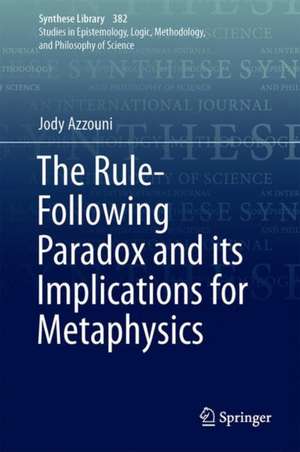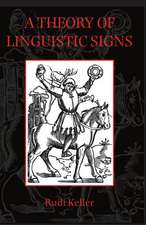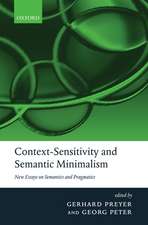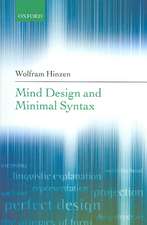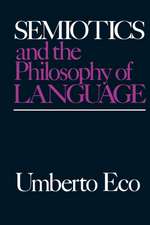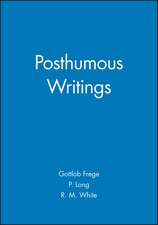The Rule-Following Paradox and its Implications for Metaphysics: Synthese Library, cartea 382
Autor Jody Azzounien Limba Engleză Paperback – 4 sep 2017
Kripke’s influential version of Wittgenstein’s rule-following paradox—and Wittgenstein’s views more generally—on the contrary, make rule-following practices and assertions about those practices subject to community norms without which they lose their cogency.
Azzouni summarizes and develops Kripke’s original version of Wittgenstein’s rule-following paradox to make salient the linchpin assumptions of the paradox. By doing so, Azzouni reveals how compelling Kripke’s earlier work on the paradox was. Objections raised over the years by Fodor, Forbes Ginsborg, Goldfarb, Tait, Wright, and many others, are all shown to fail. No straight solution (a solution that denies an assumption of the
paradox) can be made to work. Azzouni illustrates this in detail by showing that a popular family of straight solutions due to Lewis and refined by Williams, “reference magnetism,” fail as well. And yet an overlooked sceptical solution is still available in logical space. Azzouni describes a series of “disposition-meaning” private languages that he shows can be successfully used by a population of speakers to communicate with one another despite their ideolectical character. The same sorts of languages enable solitary “Robinson Crusoes” to survive and flourish in their island habitats. These languages—sufficiently refined—have the same properties normal human languages have; and this is the key to solving the rule-following paradox without sacrificing the individual’s authority over her self-imposed rules or her ability to follow those rules.
Azzouni concludes this unusual monograph by uncovering a striking resemblance between the rule-following paradox and
Hume’s problem of induction: he shows the rule-following paradox to be a corollary of Hume’s problem that arises when the problem of induction is applied to an individual’s own abilities to follow rules.
“The book is clearly and engagingly written, and the conclusions are well-argued-for. (Depressingly well-argued-for in the case of Chapter 3, as I've always been partial to Lewisian responses to Putnam's model-theoretic argument--I'm rethinking that now.) And the proposed solution to the rule-following paradox really is novel.”
Joshua Brown - Gustavus Adolphus College
| Toate formatele și edițiile | Preț | Express |
|---|---|---|
| Paperback (1) | 519.79 lei 6-8 săpt. | |
| Springer International Publishing – 4 sep 2017 | 519.79 lei 6-8 săpt. | |
| Hardback (1) | 582.30 lei 6-8 săpt. | |
| Springer International Publishing – 16 mar 2017 | 582.30 lei 6-8 săpt. |
Din seria Synthese Library
- 15%
 Preț: 638.43 lei
Preț: 638.43 lei - 18%
 Preț: 989.98 lei
Preț: 989.98 lei - 15%
 Preț: 596.69 lei
Preț: 596.69 lei - 18%
 Preț: 903.93 lei
Preț: 903.93 lei - 15%
 Preț: 586.88 lei
Preț: 586.88 lei - 15%
 Preț: 696.50 lei
Preț: 696.50 lei - 18%
 Preț: 892.90 lei
Preț: 892.90 lei - 15%
 Preț: 643.34 lei
Preț: 643.34 lei -
 Preț: 282.33 lei
Preț: 282.33 lei - 5%
 Preț: 372.19 lei
Preț: 372.19 lei -
 Preț: 443.10 lei
Preț: 443.10 lei - 15%
 Preț: 637.59 lei
Preț: 637.59 lei - 18%
 Preț: 958.88 lei
Preț: 958.88 lei - 15%
 Preț: 642.36 lei
Preț: 642.36 lei - 18%
 Preț: 1230.66 lei
Preț: 1230.66 lei - 15%
 Preț: 642.83 lei
Preț: 642.83 lei - 18%
 Preț: 1000.39 lei
Preț: 1000.39 lei -
 Preț: 389.70 lei
Preț: 389.70 lei - 15%
 Preț: 637.28 lei
Preț: 637.28 lei - 18%
 Preț: 952.26 lei
Preț: 952.26 lei - 18%
 Preț: 1231.32 lei
Preț: 1231.32 lei - 15%
 Preț: 645.96 lei
Preț: 645.96 lei -
 Preț: 395.85 lei
Preț: 395.85 lei -
 Preț: 400.47 lei
Preț: 400.47 lei - 18%
 Preț: 1225.48 lei
Preț: 1225.48 lei - 15%
 Preț: 638.89 lei
Preț: 638.89 lei - 18%
 Preț: 1232.09 lei
Preț: 1232.09 lei -
 Preț: 380.45 lei
Preț: 380.45 lei -
 Preț: 394.87 lei
Preț: 394.87 lei - 15%
 Preț: 640.37 lei
Preț: 640.37 lei - 15%
 Preț: 639.08 lei
Preț: 639.08 lei -
 Preț: 381.98 lei
Preț: 381.98 lei - 15%
 Preț: 643.00 lei
Preț: 643.00 lei - 15%
 Preț: 672.29 lei
Preț: 672.29 lei
Preț: 519.79 lei
Preț vechi: 611.52 lei
-15% Nou
Puncte Express: 780
Preț estimativ în valută:
99.47€ • 103.72$ • 82.67£
99.47€ • 103.72$ • 82.67£
Carte tipărită la comandă
Livrare economică 21 martie-04 aprilie
Preluare comenzi: 021 569.72.76
Specificații
ISBN-13: 9783319583365
ISBN-10: 3319583360
Pagini: 124
Ilustrații: VIII, 128 p.
Dimensiuni: 155 x 235 mm
Greutate: 0.2 kg
Ediția:1st ed. 2017
Editura: Springer International Publishing
Colecția Springer
Seria Synthese Library
Locul publicării:Cham, Switzerland
ISBN-10: 3319583360
Pagini: 124
Ilustrații: VIII, 128 p.
Dimensiuni: 155 x 235 mm
Greutate: 0.2 kg
Ediția:1st ed. 2017
Editura: Springer International Publishing
Colecția Springer
Seria Synthese Library
Locul publicării:Cham, Switzerland
Cuprins
1. General Introduction.- 2. Kripke’s version of Wittgenstein’s paradox and his solution.- 3. Two versions of Robinson Crusoe.- 4. Reference Magnetism.- 5. How Positive Success Curves Enable Private Rule Following.- 6. Truth and Falsity Attributions and Truth-Conditional Semantics in Private Languages.- 7. Correspondence Metaphysics and the Cogency of a God’s Eye View.
Recenzii
“This book is accessible and clear. It provides a valid discussion of the topic of rule-following practices and normativity, and proposes an interesting and necessary alternative to Kripke’s omnipresent skeptical solution. … the literature on normativity of meaning is immense, and one only can be ‘glancingly aware of much of that literature.’ This is, with no doubt, a must-read monograph." (Juan J. Colomina, Studia Logica, Vol. 107, 2019)
Notă biografică
Jody Azzouni is the author of Talking about Nothing: Numbers, Hallucinations, and Fictions (2010, Oxford), Semantic Perception: How the Illusion of a Common Language Arises and Persists (2013, Oxford), Deflating Existential Consequence: A case for Nominalism (2004, Oxford), and several other books. He’s also published numerous articles in philosophy of mathematics, ontology, philosophy of language, philosophy of science, and other areas. He’s currently professor of philosophy at Tufts University.
Textul de pe ultima copertă
This monograph presents Azzouni’s new approach to the rule-following paradox. His solution leaves intact an isolated individual’s capacity to follow rules, and it simultaneously avoids replacing the truth conditions for meaning-talk with mere assertability conditions for that talk.
Kripke’s influential version of Wittgenstein’s rule-following paradox—and Wittgenstein’s views more generally—on the contrary, make rule-following practices and assertions about those practices subject to community norms without which they lose their cogency.
Azzouni summarizes and develops Kripke’s original version of Wittgenstein’s rule-following paradox to make salient the linchpin assumptions of the paradox. By doing so, Azzouni reveals how compelling Kripke’s earlier work on the paradox was. Objections raised over the years by Fodor, Forbes Ginsborg, Goldfarb, Tait, Wright, and many others, are all shown to fail. No straight solution (a solution that denies an assumption of the paradox) can be made to work. Azzouni illustrates this in detail by showing that a popular family of straight solutions due to Lewis and refined by Williams, “reference magnetism,” fail as well. And yet an overlooked sceptical solution is still available in logical space. Azzouni describes a series of “disposition-meaning” private languages that he shows can be successfully used by a population of speakers to communicate with one another despite their ideolectical character. The same sorts of languages enable solitary “Robinson Crusoes” to survive and flourish in their island habitats. These languages—sufficiently refined—have the same properties normal human languages have; and this is the key to solving the rule-following paradox without sacrificing the individual’s authority over her self-imposed rules or her ability to follow those rules. Azzouni concludes this unusual monograph by uncovering a striking resemblance between the rule-following paradox and Hume’s problem of induction: he shows the rule-following paradox to be a corollary of Hume’s problem that arises when the problem of induction is applied to an individual’s own abilities to follow rules.
Depressing
ly well-argued
Kripke’s influential version of Wittgenstein’s rule-following paradox—and Wittgenstein’s views more generally—on the contrary, make rule-following practices and assertions about those practices subject to community norms without which they lose their cogency.
Azzouni summarizes and develops Kripke’s original version of Wittgenstein’s rule-following paradox to make salient the linchpin assumptions of the paradox. By doing so, Azzouni reveals how compelling Kripke’s earlier work on the paradox was. Objections raised over the years by Fodor, Forbes Ginsborg, Goldfarb, Tait, Wright, and many others, are all shown to fail. No straight solution (a solution that denies an assumption of the paradox) can be made to work. Azzouni illustrates this in detail by showing that a popular family of straight solutions due to Lewis and refined by Williams, “reference magnetism,” fail as well. And yet an overlooked sceptical solution is still available in logical space. Azzouni describes a series of “disposition-meaning” private languages that he shows can be successfully used by a population of speakers to communicate with one another despite their ideolectical character. The same sorts of languages enable solitary “Robinson Crusoes” to survive and flourish in their island habitats. These languages—sufficiently refined—have the same properties normal human languages have; and this is the key to solving the rule-following paradox without sacrificing the individual’s authority over her self-imposed rules or her ability to follow those rules. Azzouni concludes this unusual monograph by uncovering a striking resemblance between the rule-following paradox and Hume’s problem of induction: he shows the rule-following paradox to be a corollary of Hume’s problem that arises when the problem of induction is applied to an individual’s own abilities to follow rules.
Depressing
ly well-argued
Caracteristici
Presents a new approach to the rule-following problem Offers arguments against reference magnetism Features a fresh view of truth conditional semantics
